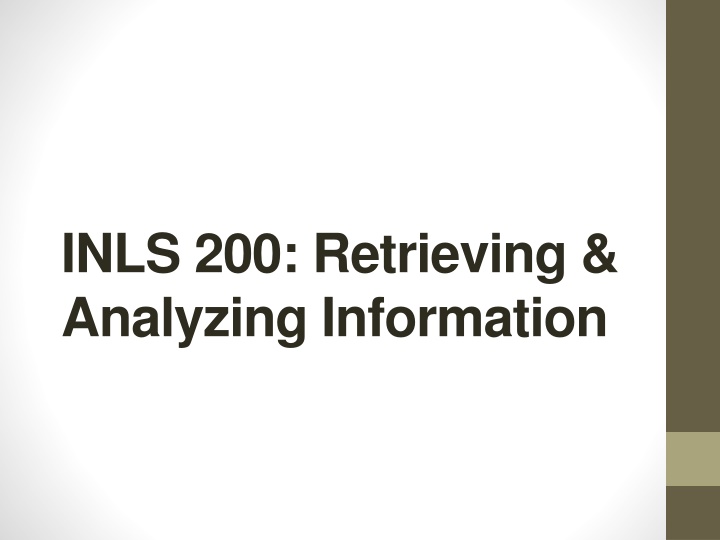
Developing Effective Research Questions: Strategies and Tips
Learn how to develop research questions effectively, whether through personal experience or logical gaps in knowledge. Understand the importance, feasibility, and potential outcomes of your research questions. Discover key insights from Wildemuth's research methods in information and library science.
Download Presentation

Please find below an Image/Link to download the presentation.
The content on the website is provided AS IS for your information and personal use only. It may not be sold, licensed, or shared on other websites without obtaining consent from the author. If you encounter any issues during the download, it is possible that the publisher has removed the file from their server.
You are allowed to download the files provided on this website for personal or commercial use, subject to the condition that they are used lawfully. All files are the property of their respective owners.
The content on the website is provided AS IS for your information and personal use only. It may not be sold, licensed, or shared on other websites without obtaining consent from the author.
E N D
Presentation Transcript
INLS 200: Retrieving & Analyzing Information
Ford (2012), chap. 3, Clarifying what is required of you Analyze exactly what is expected Identify the research questions Interpret the question correctly Answer the question effectively The process 2
Clarifying the Nature of Your Assignment
A. You have been provided with a list of essays/topics from which to choose (rather than having to think of one yourself), and the work will be based on your reading (i.e. it will not entail collecting data such as from questionnaires or interviews). B. You have to think of an essay/project topic yourself (rather than choosing from a list), and the work will be based on your reading (i.e. it will not entail collecting your own data such as from questionnaires or interviews). C. You have been provided with a list of project topics from which to choose (rather than having to think of one yourself), and the project will involve collecting and analysing data (e.g. from questionnaires or interviews). D. You have to think of a topic or title yourself (rather than choosing from a list), and the project will involve collecting and analysing data (e.g. from questionnaires or interviews).
Developing a research question* Two general ways RQs originate: 1. Your own experience and/or direct observation 2. Logical gaps that exist in our current knowledge of the field 5 *Wildemuth, B. M. (2009). Applications of Social Research Methods to Questions in Information and Library Science. Westport, Conn.: Libraries Unlimited.
Developing a research question* Understanding what you want to ask 1. The question isn t really a question unless there is some uncertainty about it 2. What is the importance of the question what don t we know that matters? 3. Symmetry of potential outcomes no matter whether you confirm or refute your initial hypothesis, the findings of the study will be useful 4. What is the feasibility of answering this question? 6 *Wildemuth, B. M. (2009). Applications of Social Research Methods to Questions in Information and Library Science. Westport, Conn.: Libraries Unlimited.
Developing a research question Preliminary RQ --Avoid research questions that are: T oo broad What is the history of public attitudes towards gender in the U.S.? How have college sports programs influenced management budget planning in large universities T oo bland What is biochemistry? How do motor engines work? T oo speculative What will the housing market look like in 2050? Will the physical book still be used in university classrooms in the future? 7
Developing a research question* Attributes of a good research question: 1. It is clear, unambiguous and easily understood 2. It is specific enough to suggest the data that you need to collect during your study 3. It is answerable, i.e., feasible given your access to data and available information 4. It is interconnected with important concepts of phenomenon 5. It is substantively relative to the field 8 *Wildemuth, B. M. (2009). Applications of Social Research Methods to Questions in Information and Library Science. Westport, Conn.: Libraries Unlimited.
Process of putting together an essay or project.
